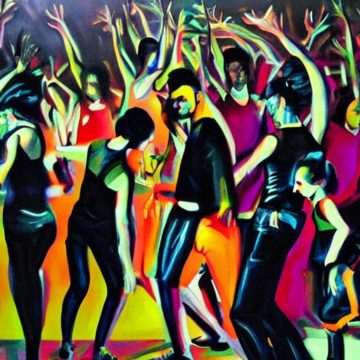 Anton Jäger in The Point:
Anton Jäger in The Point:
The photographs come in a bright, nearly fluorescent hue. Their connecting theme is “love.” In a portrait called Love (hands in hair), a woman with reddish hair and shuttered eyes is clutched by a pair of male hands reaching from outside the frame. In another picture a man in a jean jacket dances alone, almost reaching for a nearby hand. In Love (hands praying), a woman with closed eyes folds her hands amidst a crowd of partygoers. As if in a secular ritual, she meditates in the anonymity of the nightclub. The people in the photographs dance to music modeled on noises emitted by the industrial machinery of Detroit and Manchester, the twin birth cities of techno.
In 1989, however—the year in which these photos were taken—the machines are no longer operative. Most of them have downsized or relocated to China, whereas the twin cities of techno have deindustrialized. Traveling through a Chinese megacity some years before, the German photographer Hilla Becher noticed a reassembled copy of a steel mill she once shot in Europe. Now, the youngsters in Wolfgang Tillmans’s nightlife photographs seek to dance away industry, politics and history itself.
The time and place of Tillmans’s shots are worth noting. They document a Thatcherite London and a Berlin in which the Wall is crumbling. To the east, state socialism is nearing collapse. A fully global capitalism is triumphant. Western deindustrialization is accelerating. Deployed the same year the American political scientist Francis Fukuyama published his fabled essay on “the end of history” in the National Interest, Tillmans’s camera becomes witness to an exercise in collective amnesia: an attempt to banish the ideological specters of the last century and quietly stride into a private utopia. An age of “post-politics” has opened.
More here.
